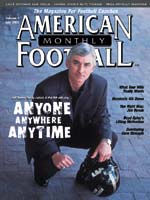Article CategoriesAFM Magazine
|
The Home TeamThe most important team you\'ll ever play for is the one at homeby: Aaron S. Lee © More from this issue 8 Tips In an effort to keep
football coaches on good terms with their significant others,
AFM has compiled these eight tips to help you maintain balance
between career and family:
|
|
|||||||
| HOME |
MAGAZINE |
SUBSCRIBE | ONLINE COLUMNISTS | COACHING VIDEOS |
Copyright 2026, AmericanFootballMonthly.com
All Rights Reserved





